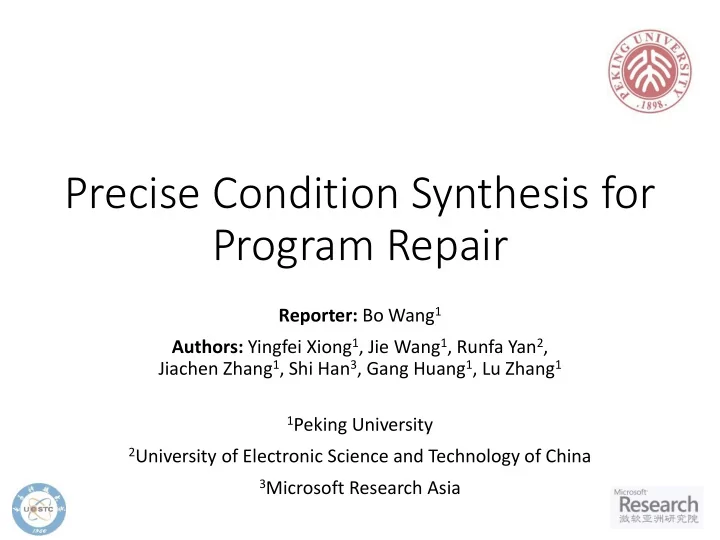

Precise Condition Synthesis for Program Repair Reporter: Bo Wang 1 Authors: Yingfei Xiong 1 , Jie Wang 1 , Runfa Yan 2 , Jiachen Zhang 1 , Shi Han 3 , Gang Huang 1 , Lu Zhang 1 1 Peking University 2 University of Electronic Science and Technology of China 3 Microsoft Research Asia
About me Bo Wang ( 王 博 ) Ph.D Student (3 rd year), Peking University Supervised by Prof. Yingfei Xiong Software testing • Faster Mutation Analysis via Equivalence Modulo States. ISSTA’17, ACM SIGSOFT Distinguished Paper Award • Dynamic analysis of shared execution in software product line testing. Doctoral Symposium of SPLC’16 Program automated repair
Test-Based Program Repair Input: A program and a test suite, with at least a failed test Output: A patch that makes the program pass all tests Fault Localization “Generate - Patch Generation Validate” Framework Patch Validation GenProg, PAR, SemFix, Nopol, DirectFix, SPR, QACrashFix, Prophet, Angelix, …
Precision • The problem of weak test suites [Qi-ISSTA15] • Test suites in real world projects are often too weak to guarantee patch correctness #𝐷𝑝𝑠𝑠𝑓𝑑𝑢𝑚𝑧 𝑆𝑓𝑞𝑏𝑗𝑠𝑓𝑒 𝐸𝑓𝑔𝑓𝑑𝑢𝑡 • Precision = #𝐵𝑚𝑚 𝐸𝑓𝑔𝑓𝑑𝑢𝑡 𝑥𝑗𝑢ℎ 𝑄𝑏𝑢𝑑ℎ𝑓𝑡 • Precision of existing approaches 1 • jGenProg 18.5% 2 • Nopol 14.3% 2 • Prophet 38.5% 3 • Angelix 35.7% 3 1. If multiple patches are generated for one defect, only the fist is considered 2. Evaluated on Defects4J benchmark 3. Evaluated on ManyBugs benchmark
Goal of This Talk • Goal: to repair programs with a high precision • Targeted defect class: condition bugs lcm = Math.abs(a+b); + if (lcm == Integer.MIN_Value) Missing boundary checks + throw new ArithmeticException(); - if (hours <= 24) + if (hours < 24) Conditions too weak or too strong withinOneDay=true; Condition bugs are common
ACS System • ACS = Accurate Condition Synthesis • Two sets of templates for repair Oracle Returning • Inserting one of the following statement before the last executed statement • if ($C) throw ${Expected Exception}; Need to • if ($C) return ${Expected Output}; synthesize Condition Modifying condition $C • Changing the condition located by predicate switching • if ($D) => if ($D || $C) • if ($D) => if ($D && $C)
Challenge – Many incorrect conditions pass the tests Test 1 (Passed): Test 2 (Failed): Input: a = 1, b = 50 Input: a = Integer.MIN_VALUE, b = 1 Oracle: lcm = 50 Oracle: Expected(ArithmeticException) Correct condition: Incorrect conditions: • lcm == Integer.MIN_VALUE a != 1 • b == 1 • lcm != 50 • …
Idea: Rank the Conditions • Rank potential conditions by their probabilities of being correct • Validate the conditions one by one • Stop validating when the probability is too low Condition1 Condition2 Condition3 95% 85% 75% Validate: pass Validate: fail
Idea: Rank the Conditions • Rank potential conditions by their probabilities of being correct • Validate the conditions one by one • Stop validating when the probability is too low Condition1 Condition2 Condition3 95% 85% 75% Validate: fail Validate: fail Stop
Ranking Conditions is Difficult • The number of potential conditions is large • Cannot enumerate the conditions • Difficult to perform statistics • Why cannot simply utilize statistic? • Numerous conditions in the real world projects • The probability of a single condition is extremely low. Such as, len < 1 , length < 1, arrLen < 1 …
Solution: Divide-and-Conquer lcm == Integer.MIN_VALUE a != 1 Variables Predicates b == 1 lcm != 50 Allows Enables more refined Enumerable statistics ranking techniques Step 1: Rank variables Step 2: Rank predicates for each variable
Ranking Method 1: Rank Variables by Data-Dependency • Locality of variable uses : recently assigned variables are more likely to be used • Rank variables by data-dependency • lcm = Math.abs(mulAndCheck(a/gdc(a, b), b)) a b Level 2 Level 1 lcm • Consider only variables in the first two levels
Ranking Method 2: Filter Variables by JavaDoc Only variable “initial” is considered when throwing IllegalArgumentException
Ranking Method 3: Rank Predicates by Context • The predicates tested on the variables are related to its context Vector v = …; Variable Type if (v == null) return 0; int hours = …; if (hours < 24) Variable Name withinOneDay=true; int factorial() { … Method Name if (n < 21) { … • Approximate the conditional probabilities by querying GitHub • Consider only the predicates whose probabilities are larger than a threshold
Evaluation: Performance of ACS Dataset: Four Java projects from Defects4J benchmark: • Apache-Time, Apache-Lang, Apache-common-Math, Jfree-Chart • In total 224 defects
Conclusion • Can programs be automatically repaired with a high precision? • Yes, at least as high as 78.3% • How can programs be repaired with a high precision? • Rank the patches by their probabilities of correctness • Stop when the probability is too low • How can we rank them? • Divide-and-conquer with refined ranking techniques
Thank you !
Recommend
More recommend